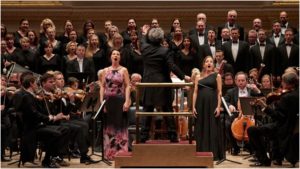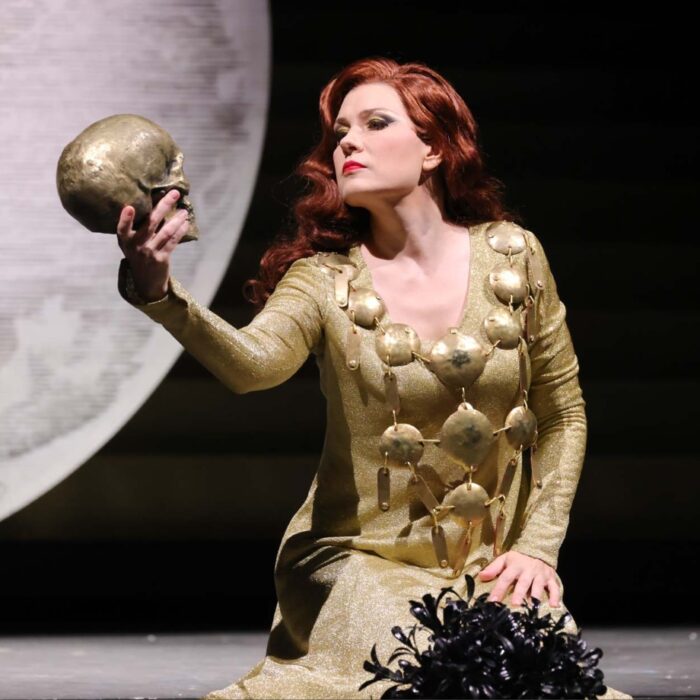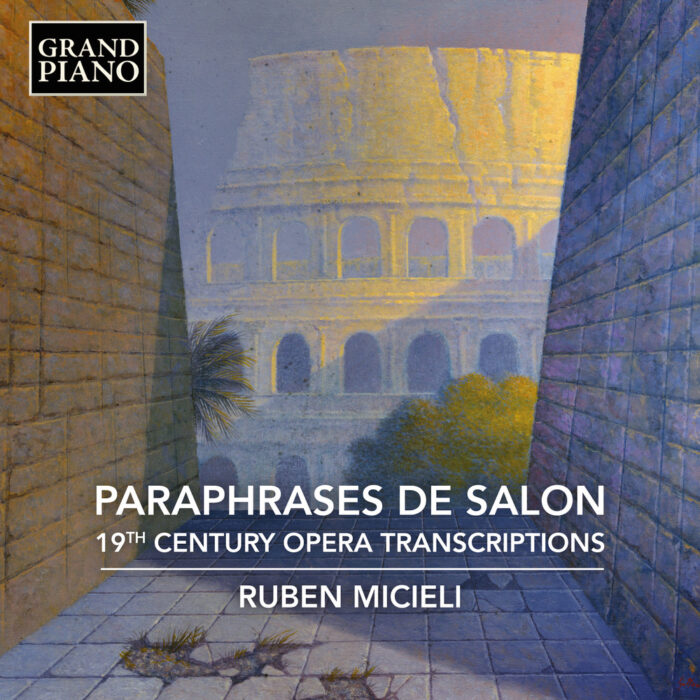
Carnegie Hall 2018-19 Review: Czech Philharmonic
An Overwhelming Performance of Mahler’s 2nd Symphony
By Matt CostelloI have attended many great performances of Mahler’s Second Symphony, the so-called “Resurrection.” The scale of the piece — requiring ten trumpets, two harps, organ, vocal soloists, chorus, and even a fernorchester (a distant orchestra) — means that any performance of this powerful masterpiece is an event.
Two memorable performances I attended occurred at the Tanglewood Festival, one led by Sejii Ozawa in remembrance Hiroshima and Nagasaki, and another, years later, conducted superbly by Manfred Honeck, filling in last minute for the Boston Symphony Conductor Andris Nelsons.
One performance, though, that will always be noted was led by Leonard Bernstein and the New York Philharmonic, only two days after the assassination of John F. Kennedy.
I would argue that the Mahler Second occupies a unique place in the canon of symphonic masterpieces. It is a towering work that can often transcend the very idea of a mere “concert” to become something more.
And, so it was that on Sunday, October 28, 2018, that I settled in to hear Semyon Bychkov lead the Czech Philharmonic in the symphony, with soloists Christiane Karg, Soprano, and Elisabeth Kulman, Mezzo-soprano.
Now, fair warning: be prepared for an excess of praise. Because if beauty can be overwhelming, at this performance, it most certainly was.
100 Years of Independence
The Mahler Symphony was being presented in honor of the 100th anniversary of Czech independence, those 100 years marked by reverses and dark days for the republic. And on this Sunday, the concert came at the end of a very difficult week for America. Probably no one sitting in the packed Carnegie Hall could have not been touched by the tumultuous events of the past week.
Then, with the stage empty, as the audience awaits, out came the chorus. In an unusual and even more dramatic move, the entire orchestra then walked out, greeted by applause. And it was as if — so slowly — the forces required for the massive work were being built before our eyes.
Until — at last — the conductor walked to the front of the stage with the soloists, who would be there for the entire performance and not simply come on stage for the latter movements.
From the beginning, conductor Bychkov made good on Mahler’s desire to create a symphony that was a “world.” There was incredible tension in the first movement from the very beginning, and also a fierceness in the brass that made the pulse race. And all the time, this exciting tumult also alternated with a supple beauty in the strings, as if two worlds were in collision.
The players radiated a passion and intensity as they met this magnificent music as if it was a dizzying, glorious challenge. The first movement was simply breathtaking.
And at times, with the stunning chaos that this long movement delivers seeming to threaten to spiral out of control, Bychkov kept the massive forces in check, with a stunning degree of artistic control and power that matched this remarkable music.
Growing And Growing
The next movements, all appreciated and enjoyed by me in the past, have never have shown as brightly as they did here.
With Mahler’s second movement suggesting a classical reprieve after the musical explosions that preceded it, we entered a world of waltz-like delicateness. It was dreamy, transporting in an entirely different way.
But Bychkov never lets Mahler’s tense reminders of what is yet to come get lost even within those more gentle movements, the beauty and tension constant, as the piece builds to that resolution, that final redemption.
The third movement seemed to ground itself with a Bohemian lilt and feel, the musical passage playing a game of hide and seek. And again, the seductive nature of this movement was — under this conductor –– as if new to me.
Then came the fourth movement, that fabulous “Urlicht,” beautifully sung by mezzo Elisabeth Kulman. I will admit to being so moved I felt tears. Her voice, the music, the very sound promising peace with its soothing, and gently powerful timbre. Kulman seemed like an angel, offering the warmth and protection of the “primal light” promised in the text.
To describe her singing as warm, and rich does not do it justice. I will – quite simply — hold onto my memory of that voice, that sound and promise of that warmth for a long time (I might only compare it the singing of the great Dame Janet Baker).
The Grand Finale
But then — we enter the last movement.
And I say “enter” because it’s as if after the respite and contrast of the three middle movements, we now return to themes and the tempests of the first. A storm of epic proportions is about to be summoned — but it would begin with the quietest of singing from the chorus.
And was that chorus ever perfect in their response to one of Bychkov’s every move.
The pace so slow, as if the sounds and promise of catharsis needs be gathered. The fernorchester, hidden behind the stage, telling us how far we have come.
Were we even in Carnegie anymore? I looked around at the audience. All so still, joined together as if one. It almost felt as if for the next few moments, any pain we may all have carried this week, this day might somehow be temporarily erased.
Then came soprano Christiane Karg, her brilliant voice soaring over us with her promise that we will rise again, the voice crystalline, a shimmering beauty. Then those words echoed by that oh-so warm mezzo-soprano voice of Kulman affirming that message.
It all builds until Mahler’s music– with the full chorus, the amazing strings and brass, harp, organ and in the end, ringing bells — shows us what it is to be alive, at this level, with this beauty, created by a single man and given life by so many.
And at the end, the audience, to a person, rocketed to their feet. Both soloists received repeated cheers, as did all the different elements of the orchestra, all highlighted and recognized by their conductor, who also obtained a massive roar of approval.
Because what happened inside that hall, where Mahler himself once conducted, was beyond memorable; it was a gift to all who heard it.
Mahler himself once wrote, “The increasing tension working up to the final climax, is so tremendous that I don’t know myself, now that it is over, how I ever came to write it.”
But he did. And we felt it on Sunday.


